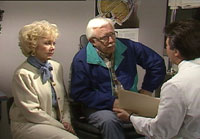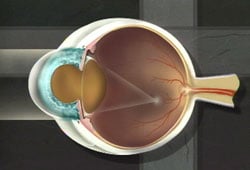Diagnosing Cataracts for Farmington Hills, Michigan
Over fifty percent of people over the age of 60 (and quite a few younger than that) suffer from cataracts. Almost everyone develops cataracts as they grow older. Cataract formations occur at different rates and can affect one or both eyes.
A cataract is a progressive clouding of the eye’s natural lens. It interferes with light passing through the eye to the retina.

Aging and other factors cause proteins in the eye’s lens to clump together forming these cloudy areas. Early changes may not disturb vision, but over time cataracts typically result in blurred or fuzzy vision and sensitivity to light. People with progressed cataracts often say they feel as if they’re looking through a waterfall or a piece of wax paper.

Symptoms of cataracts:
- Decreasing vision with age
- Blurred or double vision
- Seeing halos around bright lights
- Difficulty seeing at night
- Vision that worsens in sunlight
- Difficulty distinguishing colors
- Poor depth perception
- Frequent prescription changes for glasses
- Difficulty reading

Causes of cataracts:
- Age
- Eye trauma
- Heredity
- Diabetes
- Some medications including long-term use of oral steroids
- Ultraviolet radiation
- Smoking
- Glaucoma
- Certain metabolic conditions
Diagnosing cataracts:
Your eye doctor can perform a contrast sensitivity test to determine how much your vision has been affected by a cataract. But typically, when decreased vision affects your everyday activities or hobbies, a cataract should be treated.
Treating cataracts:
Currently there is no medical treatment to reverse or prevent the development of cataracts. Once they form, the only one way to achieve clear vision again is through cataract surgery.


